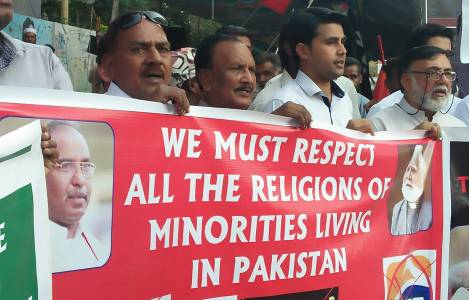
Lahore (Agenzia Fides) - To promote and build a society in which cultural, ethnic and religious discrimination is eliminated both in the general mentality and - as is still the case - in the legislation and practice of state institutions, in order to ensure equal rights and equal opportunities for all: this is the what Pakistani citizens, most of whom belong to religious, ethnic and cultural minorities, are demanding ahead of the general elections to be held in Pakistan on February 8th. The electoral campaign has begun in the South Asian country for the upcoming election, in which 127 million voters will go to the polls. In recent weeks, the Pakistan Bishops' National Commission for Justice and Peace (NCJP) has called on all political parties to "include the protection of the rights and well-being of minorities in their political programs." "Non-Muslims have played a key role in the country's development, prosperity and economic, social and cultural flourishing since the founding of Pakistan in 1947," the bishops said. This goal, also shared by civil society organizations and Muslim citizens and communities, is now expressed in a "manifesto" sent to Fides by the Pakistani Christian writer and journalist Aftab Alexander Mughal, director of the publication "Minority Concern", which aims to sensitize the country's political parties and future government that Pakistan is "a true democratic state". "Respect for the rights of all citizens, regardless of their origin, ethnicity or faith, is an important step for the good of the nation: all citizens should have a significant place in the political process and system of government of Pakistan without any discrimination," it is stated. "This means that political parties are called upon to take concrete steps to make Pakistan pluralistic and truly democratic, referring to the approach and intentions publicly expressed by Muhammad Ali Jinnah, the founder of the homeland," explains Mughal. To this end, the ruling (SMC no. 1/2014) issued by the President of the Supreme Court of Pakistan Tasaduq Hussain Jilani dated June 19, 2014 should be recalled, which specifically calls on the government and other institutions to recognize and protect the rights of minorities, starting with state legislation and practice. "Seats should also be reserved for non-Muslim citizens in parliament. The appointment process for these seats should be representative, merit-based and transparent," hopes Mughal. One of the problems that needs to be addressed in advance, says Mughal, is "combating incitement to hatred against non-Muslims in society, which begins at school." This cultural work is crucial, because it creates a culture and mentality of peace, respect and harmony among children and young people - instead of hatred and hostility," he emphasizes. To this end, Pakistani Christians, Hindus, Ahmadis and other communities are calling for the reinstatement of the "Ministry of Minority Rights", an institution with a minister - in the past embodied by the Catholic minister Shahbaz Bhatti - who will coordinate a special "National Commission for Minorities", whose task would be to bring the most pressing problems onto the political agenda of Parliament and the Government, such as discriminatory laws and practices that contradict international human rights conventions, problems in the areas of education and development, cases of kidnapping and forced marriages of non-Muslim girls. All this to promote real protection of minorities in society. Finally, a special demand comes from the religious communities, which ask the state for land to build their temples and places of worship, as is regularly granted for the construction of institutions, schools and mosques for believers of the Islamic religion. On the other hand, the state is once again demanding the return of property that was nationalized in the past. In particular, hundreds of educational institutions in the Sindh and Punjab regions, including Christian schools and universities, fell under "Regulation 118" of the Martial Law enacted by Zulfiqar Ali Bhutto in 1972, depriving them of private institutions and organizations (such as churches) and nationalizing them, putting the state's need to promote and organize public education in the foreground. (PA) (Agenzia Fides, 4/1/2024)